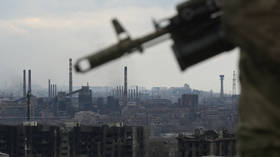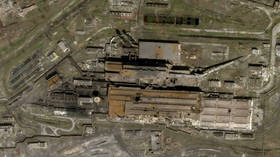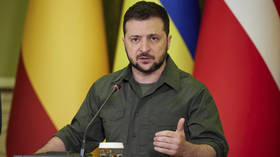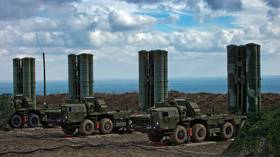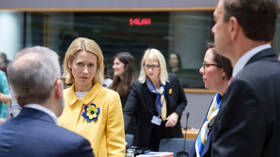Besieged Ukrainian commander appeals to Turkey
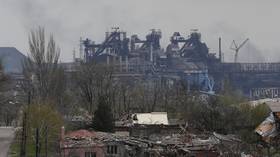
Sergey Volina, the commander of Ukraine’s 36th Marines brigade, which is still entrenched at the Azovstal steel plant in the Black Sea port-city of Mariupol together with the neo-Nazi Azov regiment, has called on Turkey’s President Recep Tayyip Erdogan to “extract” Ukrainian troops from the city.
The commander was talking to Turkish broadcaster Haberturk TV late on Friday.
“I now call on the Turkish people and the president to launch the extraction procedure,” Volina said, urging Ankara to “do everything possible to take the Mariupol garrison to Turkey” and provide it with “security guarantees.”
The marines’ commander has admitted that his troops are in a “very difficult” situation after 65 days of fighting Russian forces. He has also revealed that those entrenched at the steel plant include some 600 wounded soldiers.
He did not elaborate on whether he was referring solely to his own unit or to the Azov regiment as well. Volyna has also maintained that there are civilians hiding in the underground catacombs beneath the vast complex of the steel plant and there are injured among them as well.
Ankara has not responded to this appeal in any way so far. The Black Sea port of Mariupol has seen intense fighting since the start of the Russian military action in Ukraine in late February. The city was encircled by Russian forces and militias of the two Donbass republics in early March.
The Ukrainian forces as well as foreign mercenaries and militants that initially holed up in the city eventually retreated to the Azovstal plant. Now, the site remains the last pocket of resistance. Built in Soviet times, the facility has a massive network of underground tunnels, turned into a fortress by the Ukrainian forces.
On April 21, Russian Defense Minister Sergey Shoigu told President Vladimir Putin that Mariupol has been fully under Russia’s control except for the Azovstal plant. The president then called off an assault on the facility and instead offered those entrenched there a chance to surrender.
Russia guarantees anyone who would lay down their arms their lives, as well as “decent treatment under all international norms,” Putin outlined at that time. Moscow also said it sought to organize humanitarian corridors for those willing to exit the Azovstal plant several times before April 21 but those attempts failed.
Instead, the Azov militants and the Ukrainian forces, including Voluna himself, demanded they be allowed to leave through the assistance of an unnamed "third party" while also keeping their personal weapons. They also maintained that surrender was not an option.
On April 22, the Russian Defense Ministry said that the Ukrainian fighters and foreign mercenaries only need to raise white flags along the perimeter of Azovstal to be able to surrender. “This humanitarian offer by Russia remains in force 24/7,” it added. Some 2,000 Ukrainian fighters remain at the plant, according to the ministry’s estimates.
Kiev still maintains that Ukrainian forces would be able to rescue the troops holed up in Mariupol if provided with enough weapons. “There is a military way” to unblock Mariupol, President Volodymyr Zelensky told the media on April 21 as he called on western nations to supply Ukraine with more pieces of heavy equipment.
Russia attacked the neighboring state in late February, following Ukraine’s failure to implement the terms of the Minsk agreements, first signed in 2014, and Moscow’s eventual recognition of the Donbass republics of Donetsk and Lugansk. The German- and French-brokered protocols were designed to give the breakaway regions special status within the Ukrainian state.
The Kremlin has since demanded that Ukraine officially declare itself a neutral country that will never join the US-led NATO military bloc. Kiev insists the Russian offensive was completely unprovoked and has denied claims it was planning to retake the two republics by force.
